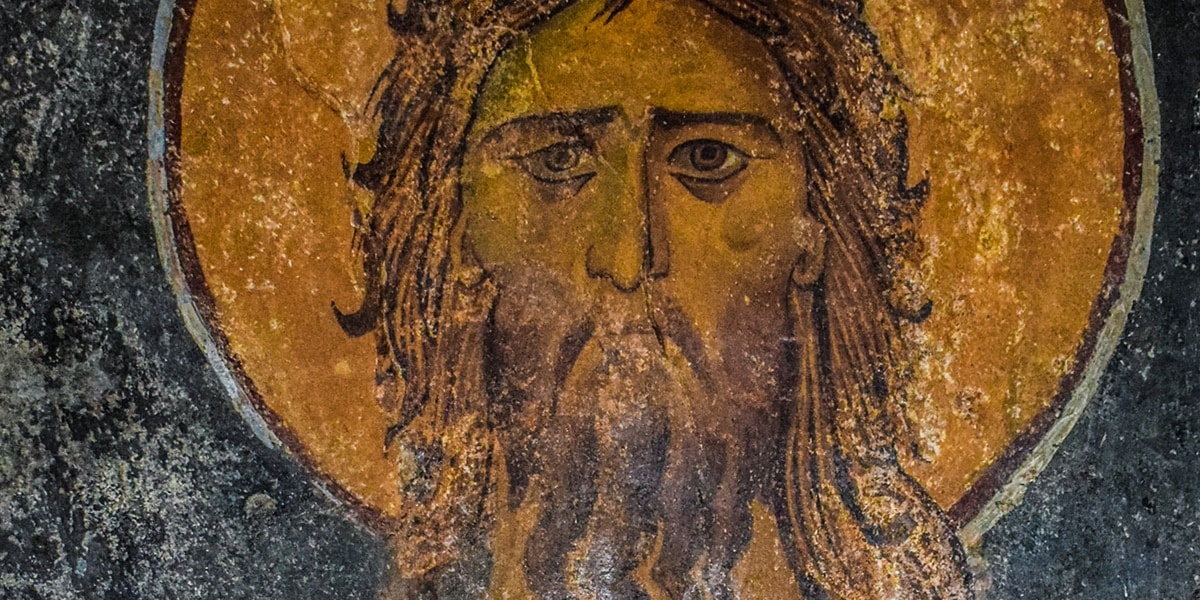Is our faith, our spirit, a lively witness to others? Does our presence point others to Jesus—as St. John the Baptist’s did in his lifetime?
If you were playing a game of association, you might be asked, “What is the first thing that comes to mind when you hear John the Baptist?” Do you see images of an ascetical man with straggly hair, clothed in skins? Do you hear a stirring call to conversion? Or perhaps you have an instant picture of John baptizing crowds of penitents at the Jordan.
John has, after all, been the subject of such famous artists as Leonardo da Vinci, Botticelli, Caravaggio, Donatello, Michelangelo and Titian. So our imaginations have been primed. But what do the four Gospels tell us of John?
Just as each Gospel writer has a unique purpose for writing and favorite themes that are woven through the text, each author portrays John the Baptist in a somewhat different light. Mark focuses on John as the forerunner. In Matthew, John is primarily the preacher of repentance. Luke draws our attention to John as prophet, while John’s Gospel presents him as the witness and herald of Jesus.
Each of these images offers the reader particular insights into the role of John the Baptist. At the same time these varied portraits present the reader with key questions for reflection upon one’s own life.
Preacher
With Matthew’s Gospel, John is the preacher of repentance. Here the author includes the content of John’s exhortation: “Repent, for the kingdom of heaven is at hand!” (3:2).
The message is twofold. There is a call to repentance, a word that means “to turn around, to change one’s mind and heart.” To repent is not just a matter of expressing sorrow for something. It is to have an entirely new orientation. The second part of John’s message is his proclamation that the kingdom of heaven is near.
Repentance, then, is a response to this nearness. True repentance or turning is always a turning toward the goodness of God, the nearness of God’s grace. It is this turning toward the presence of God that enables one to turn away from wrongdoing. Here Matthew, like Mark, depicts John as a dynamic and influential preacher of true repentance. “At that time Jerusalem, all Judea, and the whole region around the Jordan were going out to him and were being baptized by him in the Jordan River as they acknowledged their sins” (3:5-6).
John makes it clear that baptism is no empty ritual. His baptism signifies a genuine turning in a person’s life expressed in action. In Matthew, there is a confrontation with the Pharisees and Sadducees when John sees them coming to his baptism.
Throughout this Gospel, these Jewish leaders are depicted as those who reject Jesus. Already with the appearance of John the Baptist, Matthew points toward this opposition. His words to them remain a potent challenge to contemporary readers: “Produce good fruit as evidence of your repentance” (3:8). In other words, they must “Give some indication in your lives that your repentance is sincere.”
Genuine conversion or change of heart is always manifest in how one lives. Later in this Gospel, Jesus also uses the imagery of producing good fruit: “By their fruits you will know them” (7:20).
Matthew’s depiction of John the Baptist encourages us to hear anew his twofold message. We might ask ourselves: Where and how are we aware of the nearness of God’s grace? Secondly, how do we turn toward it? Do we experience a change of heart, a reorientation of our values and decisions when we notice God’s presence? What fruits have been produced?
Such reflection can help us to become more keenly aware of grace and of the process of conversion subtly at work in us.
Those of us who enjoy tending plants or gardens know what it is like to wonder if this flower or that plant will actually blossom or bear fruit. Then one day we are delightfully surprised to find tomatoes on our plants or buds on the Christmas cactus. Similarly, we might discover that, if we look closely, there are signs of new fruit in our lives, or at least the inner nudges to bear fruit in a new way.
Prophet
In Luke, John the Baptist is introduced even before he is born. Three scenes in the Infancy Narrative give attention to John’s role. In the Annunciation scene with Zechariah, the angel appears to him, promising a son. His words to Zechariah outline the prophetic role of John.
“He will be filled with the Holy Spirit even from his mother’s womb, and he will turn many of the children of Israel to the Lord their God. He will go before him in the spirit and power of Elijah” (1:15-17).
At the Visitation, when Mary approaches Elizabeth, Luke describes the baby in Elizabeth’s womb leaping for joy, already responding to the presence of Jesus.
Finally, on the day John is circumcised and named, Zechariah himself is filled with the Spirit and prophesies. In his canticle, he addresses his son, “You, child, will be called prophet of the Most High, for you will go before the Lord to prepare his ways” (1:76).
When John is to begin his preaching, Luke uses an expression that is often employed in the Old Testament to emphasize the fact that prophets were moved by God and spoke under God’s influence: “The word of God came to John” (3:2). As in Matthew’s Gospel, John preaches repentance and urges the crowds to produce good fruits. Luke, however, expands upon John’s teaching. The crowds ask what they should do.
John’s response puts him squarely in the tradition of the prophets. He urges them not to do extraordinary feats of fasting, but to have compassion for the poor and to deal justly with their neighbors. They are to share their food and clothing. When specific groups of people raise the same question, his answers are direct and practical.
Tax collectors are told, “Stop collecting more than what is prescribed” (3:13). Soldiers are advised, “Do not practice extortion, do not falsely accuse anyone, and be satisfied with your wages” (3:14). John even dares to speak the truth to Herod, censuring him for marrying his brother’s wife and for all the evil deeds he has committed. Like prophets before him, John suffers imprisonment and death because of his courageous message of truth.
Reflecting upon John as prophet, we might ask ourselves: When are we aware of the Spirit’s power within us? Perhaps imagining ourselves in a prophetic role seems overwhelming for many of us, but with John, we are asked to recognize those moments when the word of God comes to us in a particular way.
What do we do with those nudges, those wake-up calls? In what situations do we speak out or act on behalf of the poor or those who suffer injustice? Whose words and/or example are prophetic for us, urging us to become aware of those things that are within our power to do?
I recently received a note from a friend who knitted her prayers and concern for someone who was chronically ill into a shawl and sent it to her. A few of her friends observed the prayerful knitting and realized that this was something they could also do. The next thing she knew, she was speaking to a group of 40 women who were interested in learning how to become involved in this type of outreach.
We probably all know of individuals whose example has somehow motivated others to visit nursing homes, work in soup kitchens or volunteer with Habitat for Humanity. Perhaps you’ve done a little prophetic nudging yourself!
Witness
The Gospel of John the Evangelist is particularly focused on John the Baptist as witness. In the Prologue of this Gospel, Jesus is understood as the preexistent Word “in the beginning with God” (1:2). He is also described as the light that shines in the darkness.
The role of John the Baptist is seen specifically in relation to Jesus: “He came for testimony, to testify to the light” (1:7). John is the herald, the one who gives witness to Jesus. In each of the Gospels, John the Baptist is portrayed as secondary to Jesus. Jesus is stronger; Jesus is the one whose sandal John is not worthy to untie. Here the evangelist could not be clearer: “He [John the Baptist] was not the light, but came to testify to the light” (1:8).
In this Gospel, John is consistently seen as pointing away from himself and testifying to Jesus. The Prologue summarizes his ministry: “John testified to him [Jesus] and cried out, saying, ‘This was he of whom I said, “The one who is coming after me ranks ahead of me”’” (1:15). Three separate scenes illustrate this truth. In the first narrative, priests and Levites directly ask John who he is. He asserts that he is neither the Messiah nor Elijah. Rather, quoting Isaiah, he identifies himself as the voice of one crying out in the desert, “Prepare the way of the Lord” (40:3).
The next day, when he sees Jesus coming, he uses that voice, crying out, “Behold, the Lamb of God….He is the one of whom I said…” John then says that he came baptizing “that he [Jesus] might be made known” (1:29-31). He recounts the story of Jesus’ baptism as the moment in which Jesus’ identity was revealed to him: “Now I have seen and testified that he is the Son of God” (1:34).
In a third scene, John directly points two of his own disciples toward Jesus. Seeing him walk by, John says, “Behold, the Lamb of God” (1:36). His disciples accept his testimony and turn to follow Jesus.
In the fourth Gospel, Jesus gives special tribute to John’s role as witness. When his opponents seek some basis for believing in him, Jesus reminds the people that they themselves sent emissaries to John, and “the testimony he gives on my behalf is true” (5:32).
Jesus declares that John was “a burning and shining lamp” (5:35). This image invites us to reflect upon the nature of our own lives in relation to Jesus. Is our faith, our spirit, a lively witness to others? Does our presence point others to Jesus?









2 thoughts on “St. John the Baptist: Prophet, Preacher, Witness”
Excellent analysis of how John the Baptist and his ministry in preparing for the way of the good Lord Jesus can give us all insights about how we can better live out our faith in love, hope, and trust in God’s plan 🙏
Agree, excellent analysis and insights.
Comments are closed.